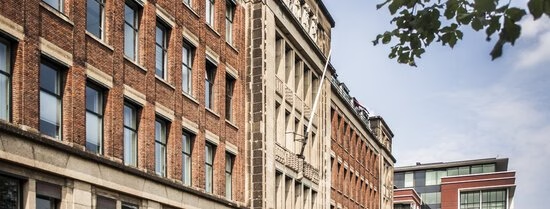In our short series, ISS through the generations, we highlight the unique experiences of current ISS students and their family members who also used to study at ISS.
When Dr Subhasish Dey looks back at his time at ISS, his memories are vivid and warm. ‘It was like my high school, where each student, teaching staff and non-teaching staff used to know each other,’ he says. Living at Dorus, the student hostel next to the building, he spent most of his days and late evenings at ISS. ‘ISS was my home. I studied, played table tennis, joined yoga classes and laughed with friends in the attic. It was welcoming, inclusive, engaging and above all, fun.’
He completed his MA in Development Studies with a specialization in Poverty Studies in 2009. For him, the institute left a permanent mark, shaping his academic journey and sparking the curiosity that led him to become a professor at a leading British university.
That is why, when his nephew Rupankar Dey walked into the ISS building in August 2022 to begin his own journey, emotions ran high. ‘I was ecstatic, thrilled and satisfied,’ Subhasish recalls. ‘The first day I took him into the ISS building, I felt emotional and realized that a circle had been completed. Nothing can be more satisfying than to see our child land in a place so close to my heart.’


Listening, learning, imagining
For Rupankar, now a doctoral researcher at the University of Groningen, the story of ISS began much earlier. ‘At just seven or eight, I listened with fascination as my uncle spoke about studying abroad, his exposure to the Netherlands and Amartya Sen’s idea of poverty as freedom and social choice. Those ideas stayed with me,’ he recalls.
The atmosphere at home helped plant the seeds. His mother encouraged him to read widely, even books beyond his age, while debates and news discussions were part of daily life. ‘Growing older, I became more critical in my thinking. I realized that ISS is the destination where my curiosity, critical perspective and questioning could be structured and developed further.’
He began to imagine ISS as a unique kind of classroom. ‘The stories I heard were of a place where questions are valued over silence, where critical thinking is encouraged, and where diverse voices come together like an à la carte menu of perspectives from development practitioners around the world. That way of learning - truly engaging with knowledge rather than just absorbing it - resonated deeply with me.’
Living the stories
When Rupankar finally joined ISS, reality lived up to the stories. ‘Classrooms genuinely value questions over silence, and critical thinking is actively encouraged,’ he says. ‘Engaging with peers and faculty allowed me to explore multiple viewpoints and deepen my understanding in ways that align closely with what I had heard growing up.’
But there were also surprises. ‘What struck me most is the personal and immersive nature of learning. It’s not just about theories; it’s about understanding people, contexts and real-world impacts. The “mini United Nations” atmosphere was even more dynamic and inspiring than I imagined.’
Then and now
Both uncle and nephew reflect on how ISS has evolved. Subhasish, who has visited regularly over the years, sees continuity as well as change. ‘The cordial and welcoming attitude of colleagues has remained unchanged.’
For Rupankar, the strength of ISS lies in the continuity of its spirit. ‘The diversity, the encouragement to think critically, the global community – all of that is alive and well. It constantly pushed me to grow in ways I hadn’t anticipated.’
- More information
Connecting the world
ISS has a growing network of 14,000+ alumni in more than 150 countries. A strong global network of development professionals, This ISS alumni community brings you opportunities for lifelong learning, professional development and social connections throughout your career. Visit our alumni portal to learn more.
- Related content
- Related education

